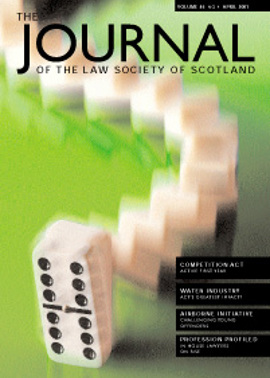President’s report
Unfortunately the foot and mouth epidemic put paid to the visit, at least for the time being. There is still much merit in the visit, but it will be much later in the year. Accordingly, the March Council meeting was held as usual at Drumsheugh Gardens, and because the strategy topics should not wait, we have decided to go ahead with a day event, also in Edinburgh, in early May.
I have already set out some of the relocation options in my January column. A number of you have already sent me your views, mainly in favour of relocation, but I would still like to hear from more of you with your thoughts. I can assure you that these will all be taken into account before any proposal is formulated.
The Future of Legal Education
Legal education is central to the future of the profession. I agree with the Society’s Education and Training Committee that it is in the interests of the profession, and more generally in the public interest, that the condition of legal education in Scotland be reviewed regularly. The review of the post-degree training regime which reached fruition with the introduction of a new skills-based Diploma last October was nearly six and a half years in gestation. The Professional Competence Course which will be undertaken during the new traineeship is in the final stages of completion and work is ongoing on the Test of Professional Competence for all trainees in their second year. I believe that the Committee is right to continue to seek improvements and review the current structures which determine the content and processes of legal education in Scotland and which may need to be updated to suit the challenges facing the legal profession today.
Over the last six and a half years the Society has learned a great deal. It started with very little de facto control of vocational training and has now achieved much greater involvement and scrutiny on behalf of the profession. Of course this means that greater resources must be provided than previously – that is inevitable. I think it also necessitates encouragement by the Society of close co-operation between the various stakeholders to ensure the proper delivery of legal education. As well as the Society these include the Faculty of Advocates and the Judiciary as providers of legal services, the general public (including commercial interests) as consumers, the universities as providers of pre-qualification legal education and the Government in respect of the public interest and the maintenance of a proper justice system. I support the Committee’s view that leadership by the Society is of critical importance and hope that this approach will find favour at the upcoming Strategy Day. In addition to this month’s article on the Test of Professional Competence, I hope that a future issue of the Journal will set out very clearly a statement of the Society’s long term aims and objectives for the future of legal education and, in due course, policies for meeting those aims and objectives.
Workload Challenges
The field of legal education is one example among many of the Society taking on more work on behalf of the profession than ever before. In fact across the board the volume of work carried out by the Council, Committees and Executive has increased dramatically over the last ten years or so. A very high proportion of that work is carried out by Council members and Committee members who are all unpaid volunteers. The system is creaking at the seams. Often the very best people to do the work on behalf of the profession are practitioners who have significant pressures on their time without any additional Society responsibilities. Some of our most effective Council members and Conveners of important Committees have had to give up their involvement with the Society because whilst they gain much from their involvement in the Society their practices and partners or organisations are suffering. The profession can ill-afford to lose the involvement of these individuals, but in the modern hard-working and competitive world that is legal practice in the twenty-first century, why should partners and colleagues be expected to suffer the cost of the days of unremunerated work put in by those Council members who do the most on behalf of the wider membership?Frankly I do not think the profession can afford to compensate firms and organisations fully for all the hours of work carried out, and any compensation would have to be modest in amount and paid only in respect of the performance of a few key roles within the Society. The Policy and Planning Group has been giving this difficult issue careful consideration over the last few months and proposals should go to the Council at the end of this month for debate. Whatever the outcome, it is again important that the Council’s deliberations be set out fully and clearly in a future issue of this Journal.
Seamill
This is my last chance to plug the Annual Conference which will take place at Seamill Hydro on 11th-13th May, preceded by the Society’s AGM. As well as the excellent business sessions we have lined up, there will be a great deal of fun for members and all the family. Making sure the children have a wonderful time has been at the top of our list of priorities, as this will ensure that parents get the most out of the social events and leisure activities taking place throughout the weekend. Please book soon if you have not already done so. I look forward to seeing you there.






